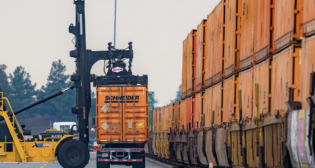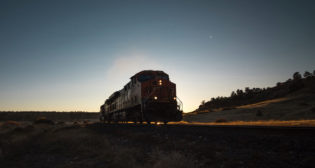
A Century of Service: The Kessel Family’s Legacy on the Rails
In America’s heartland, where steel rails stretch across vast plains and rolling hills, the Kessel family’s legacy is interwoven with the history of BNSF Railway and our predecessors.

In America’s heartland, where steel rails stretch across vast plains and rolling hills, the Kessel family’s legacy is interwoven with the history of BNSF Railway and our predecessors.

Canadian Pacific Kansas City’s long-awaited Final Spike Anniversary Steam Tour of Canadian Pacific Hudson 2816, The Empress, from Calgary to Mexico City to mark the one-year anniversary of CPKC’s official merger, kicked

BNSF and the American Train Dispatchers Association (ATDA) will partner with the Federal Railroad Administration (FRA) to join a one-year pilot program of the FRA-sponsored Confidential Close Call Reporting System (C3RS). Their decision to

“Our team delivered strong financial results in the first quarter as we navigated a challenging freight market and normal winter conditions,” Union Pacific (UP) CEO Jim Vena said during the Class I’s financial report on April 25. “These results build on the momentum we established as we exited 2023 and provide further proof of what’s possible as we strive to be the best in safety, service and operational excellence. This is a great start to the year, but we understand there’s work to be done to achieve our goals and meet our stakeholders’ expectations.”

Innovative Construction Group, LLC is receiving a $250,000 grant from NCRR Invests, the North Carolina Railroad Company’s (NCRR) economic development arm, to help develop a new manufacturing facility in Siler City, N.C., to be served by Norfolk Southern (NS).

Norfolk Southern (NS) has confirmed that its first-quarter 2024 financial results are in line with the preliminary results it announced April 9, one month before the May 9 shareholder’s meeting in which

Union Pacific (UP) collaborates with Vestas to ship the largest wine turbine blades across the country by rail. Also, CSX Assistant Controller Thomas McDuffie is named a Rising Star by the Florida Institute of CFOs (fiCFO); and the National Association of Manufacturers (NAM) commends Norfolk Southern’s (NS) role in supply chain continuity amid Baltimore disruptions.

U.S. rail traffic for the week ending April 20, 2024 (Week 16), came in at 474,544 carloads and intermodal units, up 0.8%—virtually flat—compared with the same week last year, based on 216,945 carloads—down 6.7% from 2023—and intermodal volume of 257,599 containers and trailers—up 8.2%, the Association of American Railroads (AAR) reported April 24.

Industry groups are calling on the U.S. Environmental Protection Agency (EPA) to reject an authorization request from the California Air Resources Board (CARB) to implement a regulation that was finalized last year,

“We exited last year with strong momentum and our performance in the first quarter, combined with an improving demand environment, has us well positioned to deliver on our 2024 guidance,” Canadian Pacific Kansas City (CPKC) President and CEO Keith Creel said in an April 24 earnings announcement. “As we enter the second year of our forever story, we are focused on safely executing on the unique and undeniable opportunities this franchise creates and delivering long-term value for our employees, customers and shareholders.”